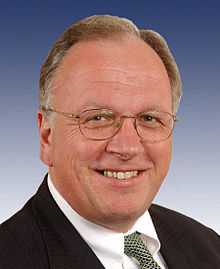
John Dennis Hastert is an American former politician, teacher, and wrestling coach who represented Illinois's 14th congressional district from 1987 to 2007 and served as the 51st Speaker of the United States House of Representatives from 1999 to 2007. Hastert was the longest-serving Republican Speaker of the House in history. After Democrats gained a majority in the House in 2007, Hastert resigned and began work as a lobbyist. In 2016, he was sentenced to 15 months in prison for financial offenses related to the sexual abuse of teenage boys.

Virginia Brown-Waite is an American politician who served as U.S. Representative for Florida's 5th congressional district from 2003 until 2011. She is a member of the Republican Party and a founder of Maggie's List.

Mark Adam Foley is an American former politician who served as a member of the United States House of Representatives. He served from 1995 until 2006, representing the 16th District of Florida as a member of the Republican Party, before resigning due to revelations that he had sent sexually explicit messages to teenaged boys who had served as congressional pages in what came to be known as the Mark Foley scandal.
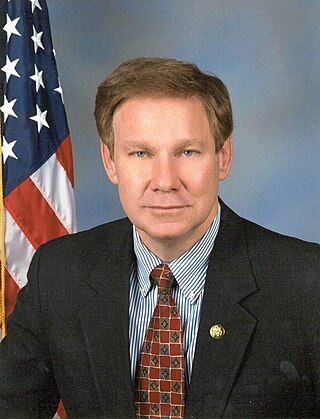
Thomas Milburn Davis III is an American lobbyist and former Republican member of the United States House of Representatives who represented Virginia's 11th congressional district in Northern Virginia. Davis was considering a run for the U.S. Senate seat being vacated by five-term incumbent and fellow Republican John Warner in the 2008 election, but decided against it. He announced on January 30, 2008, that he would not seek reelection to an eighth term. Davis resigned from Congress on November 24, 2008.
The 1983 congressional page sex scandal was a political scandal involving members of the United States House of Representatives.

John Andrew Boehner is an American retired politician who served as the 53rd speaker of the United States House of Representatives from 2011 to 2015. A member of the Republican Party, he served 13 terms as the U.S. representative for Ohio's 8th congressional district from 1991 to 2015. The district included several rural and suburban areas near Cincinnati and Dayton.

Robert William Ney is an American former politician who represented Ohio's 18th congressional district in the U.S. House of Representatives from 1995 until his resignation on November 3, 2006, after he pleaded guilty to charges of conspiracy and making false statements in relation to the Jack Abramoff Indian lobbying scandal. Before he pleaded guilty, Ney was identified in the guilty pleas of Jack Abramoff, former Tom DeLay deputy chief of staff Tony Rudy, former DeLay press secretary Michael Scanlon and former Ney chief of staff Neil Volz for receiving lavish gifts in exchange for political favors.
The National Republican Congressional Committee (NRCC) is the Republican Hill committee which works to elect Republicans to the United States House of Representatives.
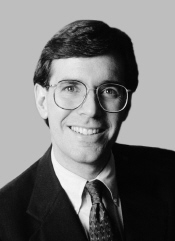
Leon William Paxon is an American lobbyist and former member of the United States House of Representatives from New York. From 1989 to 1999, he served five terms in Congress.

The U.S. House Committee on Ethics, often known simply as the Ethics Committee, is one of the committees of the United States House of Representatives. Before the 112th Congress, it was known as the Committee on Standards of Official Conduct.

Sue Weisenbarger Kelly is an American businesswoman and politician who served as a Republican member of the United States House of Representatives from 1995 to 2007, representing New York's 19th District. She was elected to the seat that had been held by Republican Hamilton Fish IV after he dropped out of the 1994 race due to prostate cancer. Kelly defeated his son, Hamilton Fish V, in that race and served until John Hall defeated her in the 2006 congressional election.

The 2006 United States House of Representatives Elections in Florida took place on November 7, 2006. Elections were held in Florida's 1st through 25th congressional districts.
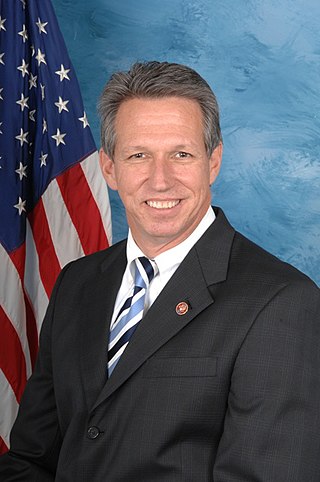
Timothy Edward Mahoney is an American politician and businessman who served as the U.S. representative for Florida's 16th congressional district from 2007 to 2009. A member of the Democratic Party, he was elected in November 2006 after his opponent, six-term Republican incumbent Mark Foley, resigned on September 29, 2006, after questions were raised about an email exchange with a congressional page.
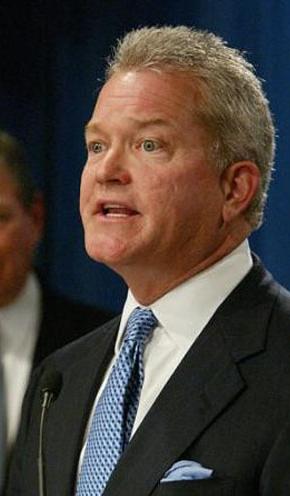
The Mark Foley scandal, which broke in late September 2006, centers on soliciting emails and sexually suggestive instant messages sent by Mark Foley, a Republican congressman from Florida, to teenaged boys who had formerly served as congressional pages. Investigation was closed by the Florida Department of Law Enforcement (FDLE) on September 19, 2008 citing insufficient evidence to pursue criminal charges as both "Congress and Mr. Foley denied us access to critical data," said FDLE Commissioner Gerald Bailey. The scandal grew to encompass the response of Republican congressional leaders to previous complaints about Foley's contacts with the pages and inconsistencies in the leaders' public statements. There were also allegations that a second Republican congressman, Jim Kolbe, had improper conduct with at least two youths, a 16-year-old page and a recently graduated page.
Kirk Fordham serves as Senior Director of Member and Board Relations for the National Association of Manufacturers.
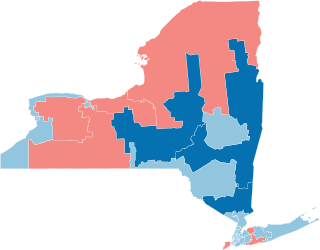
On November 7, 2006, New York, along with the rest of the country held elections for the United States House of Representatives. Democrats picked up 3 House seats, the 19th, the 20th, and the 24th.
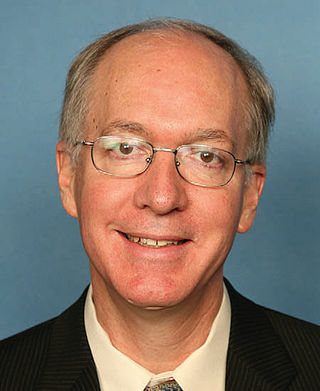
After the resignation of Republican Party United States Congressman Dennis Hastert from his Illinois's 14th congressional district seat in the United States House of Representatives on November 26, 2007, a special election was held to fill the vacancy for the remainder of the 110th United States Congress.

The 2006 congressional elections in Illinois were held November 7, 2006 to determine who would represent the State of Illinois in the United States House of Representatives.

James Lee Hagedorn was an American politician from Minnesota. A Republican, he was the U.S. representative for Minnesota's 1st congressional district from 2019 until his death. The district stretches across southern Minnesota along the border with Iowa and includes Rochester, Austin, and Mankato.
